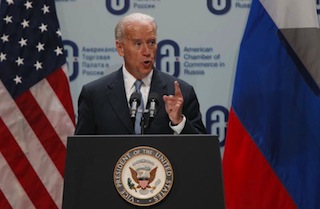U.S.-Russia Security Talks Moving Forward
April 22, 2011
Featured Image
Today's top nuclear policy stories, events, and analysis with excerpts in bullet form.
Stories we're following today - Friday, April 22, 2011:
Biden, Putin Discuss Trade, Missile Defense - AFP [link]
- US Vice President Joe Biden and Russian Prime Minister Vladimir Putin on Thursday discussed Moscow's goal of joining the World Trade Organization and missile defense cooperation, the White House said.
- They also discussed "next steps on missile defense cooperation" and "agreed on the importance of continuing momentum in relations between the United States and Russia," according to a White House statement.
- "Vice President Biden underscored the continued need for cooperation between the United States and Russia on global security issues and pledged to continue to work with Russia on facilitating travel between our two countries," it said.
Remarks by Assistant Secretary of State Rose Gottemoeller at the United States Naval Academy [link]
- Consistent with the President’s agenda to reduce the role and number of nuclear weapons, and the Senate’s call for pursuing negotiations with Russia on tactical nuclear weapons, we are working intensively throughout our government on these issues while also consulting with our NATO allies.
- We also are seeking cooperation with Russia on ballistic missile defense. Such cooperation can provide assurances to Russia that our missile defenses will not undercut strategic stability, while enhancing the ability of both nations to defend against emerging missile threats.
- Negotiated nuclear reductions to date have been dominated by bilateral U.S. and Russian negotiations. However, as we advance toward the vision of a safe, secure world without nuclear weapons we will increasingly need to strengthen cooperation on WMD issues of concern to both nuclear weapons and non-nuclear weapons states.
Iran Sanctions Bill Introduced in House - Global Security Newswire [link]
- U.S. Representative Brad Sherman (D-Calif.) last week submitted to Congress a bill that would strengthen financial and political penalties aimed at persuading Iran to halt atomic activities that could support weapons development, the lawmaker announced on Wednesday.
- “Existing Iran sanctions have had a significant impact on Iran’s economy, but have not achieved the ultimate goal of ending Iran’s nuclear weapons program. We must continue to enact tougher sanctions to isolate Iran economically and diplomatically, and we must act now,” Sherman said in a statement.
- Meanwhile, Russia said other major concerns around the world must not draw attention away from the nuclear standoff with Iran..."We have not suspended contacts with Iran and our partners from the six world powers," Deputy Foreign Minister Alexei Borodavkin [said], referring to the five permanent U.N. Security Council member nations and Germany.
How to Talk to a North Korean - Joel Wit for Foreign Policy [link]
- I have been meeting with North Koreans for almost 20 years. As head of the State Department's section charged with implementing the 1994 Agreed Framework, I held discussions with the North Korean Foreign Ministry, scientists, bureaucrats in charge of North Korea's nuclear program, military officers, intelligence officials, and others. Those talks were often difficult but could be productive.
- North Koreans use Track II encounters to break bad news, but they also use them to send important private messages that the participants -- mostly trained diplomats, scientists, and experts with both extensive international experience and practice in dealing with North Koreans -- can relay home.
- It would, of course, be infinitely preferable for governments to conduct their own discussions. But at a time when they aren't talking, unofficial channels of communication run by seasoned practitioners can be indispensible.
Beyond Our Imagination: Fukushima and the Problem of Assessing Risk - M. V. Ramana for The Bulletin of Atomic Scientists [link]
- Severe accidents at nuclear reactors have occurred much more frequently than what risk-assessment models predicted.
- The probabilistic risk assessment method does a poor job of anticipating accidents in which a single event, such as a tsunami, causes failures in multiple safety systems.
- Catastrophic nuclear accidents are inevitable, because designers and risk modelers cannot envision all possible ways in which complex systems can fail.
Resetting the Stage - The Economist [link]
- The aim of the reset was not to change Russia, still less to embrace it, but rather to restore detente in pursuit of America’s national interest. And this modest goal has been largely achieved.
- From Russia’s point of view, the expansion of NATO to include Georgia and Ukraine has been halted; warmer relations with America have detoxified relations with Poland and the Baltics; and public lecturing about human rights and democracy has largely stopped. From America’s point of view, Russia has become less of a spoiler and more co-operative in several areas of vital concern to America.
- To encourage Russia’s economic interest in the reset, the Obama administration is pushing hard for Russian membership of the World Trade Organisation, which has been under negotiation for nearly 20 years.



